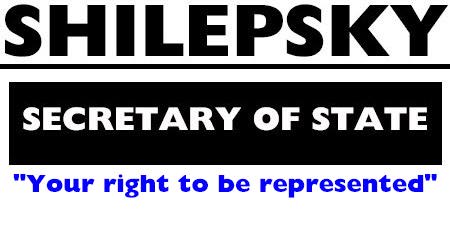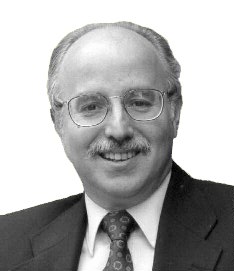1998, Secretary of State, Instant Runoff Ballot
First, the issue, Instant Runoff Ballot. I always used to believe that our two party system provided stability to our democratic republic. But that belief has been shattered in the past 20 years as our politics has become increasingly polarized, professionalized, and polluted with money. The Republican and Democratic Parties have been effectively taken over by a combination of career politicians, special interest groups, and ideological hard-liners. They have the two party game down pat. Once they finish their internal struggles over candidate nominations they go out and demonize the other party. The Republicans and Democrats can't say enough bad things about their opponents. Mention Clinton to Republicans, or Gingrich to Democrats and see their faces get red.
As a result, common sense and consensus building have gone out the window. The two parties have been talking past each other for years.
Who has suffered? The voters and the country.
Usually if the party in power does not do what people want then the other party offers to do it and then that party wins the next election. But now rigid special interest groups control the nomination process and the candidates who can traverse that obstacle course usually please the activists but don't represent the views of mainstream citizens. Think that we Reformers are not mainstream? Answer this: Who probably would better represent the average Minnesotan--Rod Grams, Paul Wellstone, or Dean Barkley?
The point is, people want an alternative but the two party system is not responding. One result is that many citizens don't bother to vote. Another is that third parties are actively organizing to fill the voids. For instance, the Green Party has affected election outcomes in New Mexico. Libertarians are a staple on C-SPAN. The Grassroots and New Parties are raising issues and attracting voter support. And of course the Reform Party has major party status in Minnesota and has received FEC recognition as a national political party, putting it into the same league as the Democrats and Republicans.
What does this have to do with Instant Runoff Ballots, and other fair share voting reforms I want to promote. Well, nowadays we talk about hearing a diversity of opinions and wanting third parties to have equitable ballot access and media access. But our electoral system discourages it. Our way of running elections systematically discourages voters from voting for third party candidates even when they want to. It's a cattle prod called the wasted vote syndrome that the two majors use to keep waiverers in the corrals of the two party system.
You know how it works. You go into vote and there are three people running. One you like. One you could live with. And one you can't stand. And you end up voting to keep the person you like least from getting elected. You vote for the "lesser of the two electable evils" because you didn't want to "throw away your vote," as they say.
You have just been herded into the two party corral by what game theorists call the "prisoner's dilemma." You had to act based on what you thought others were going to do. This phenomenon keeps third party vote totals down. For example, in 1992 Perot got 19%, but afterwards one survey asked Bush and Clinton voters "would you have voted for Perot if you thought he had a chance to win?", and 36% said yes. In 1980 John Anderson dropped from 25% to 6% as election day approached.
This drop-off discourages third party candidates and anyone whoever thinks about voting for them.
It also means that we can elect people that a majority do not like. Clinton was elected by 43% in 1992. In the 1993 Minneapolis Mayoral primary, Sharon Sayles Belton and John Derus got into the general election with 28% and 20% respectively, after four moderates split 46% of the primary vote between themselves. I know I felt disenfranchised when I had to chose between those two.
Some states have a solution for elections where no candidate wins a majority. They eliminate the lowest polling candidate and have a runoff election. Everyone can vote in it. Just because your first choice was eliminated doesn't mean you don't get a say between the remaining candidates in the runoff. But the problems with runoffs are that they are expensive and lots of voters don't bother to come back the following week.
The Instant Runoff Ballot allows us to have runoff elections without a return trip to the polls. Each voter can indicate his or her choices for an office on one ballot, ranking them 1st, 2nd, 3rd. If you first choice does not get enough first choices from other voters then your vote is transferred to your second choice. And stepwise elimination is used until one candidate has a majority.
Who is helped by this. First and most importantly, the voters. They are not put in the prisoners dilemma of having to guess what everyone else is going to do, and worrying if their vote will count. They can just vote their preference. And they are able to indicate their relative preferences and send a clearer message about what they like and don't like.
Second, it helps third parties. They can show their true strength and overcome the voter's fear of the wasted vote.
Third, it helps turnout. Voters will feel their votes are more meaningful and more worth being cast.
Fourth, we will have cleaner and more unifying elections. With the Instant Runoff Ballot candidates have to be careful about going negative. To get a majority they will probably need the 2nd or 3rd choice votes of their opponents' supporters. If you smear an opponent then that person's supporters are probably not going to put a 2 or 3 by your name at voting time. This also means that candidates will have to take opponents' ideas more seriously and dialogue about them rather than discarding them out of hand.
So Instant Runoff Ballot is a great idea. Preference voting has been done in other countries and, in the US, it has been used in multi-seat elections. And our computer technology can be used to help implement it.
OK, that's why Instant Runoff Ballot. Now why run for Secretary of State. Because in effect the Secretary of State is the state's chief election officer. So that is the office to promote Instant Runoff Ballot and fair share voting generally. Appropriately, election law changes will require legislative action and/or city charter amendment. But the Secretary of State can speak out on the issue and, like the retiring Secretary of State did, can set up a commission to gather perspectives and make proposals on how to improve our electoral system.
In fact, the office is ideal to inject fairness into our elections rather than allowing the two party monopoly to perpetuate itself. A third party Secretary of State could inject new thinking into the realm of election law. And when a commission was set up it would have significant representation from independents and third party members. They can see better how the system is failing.
So that is why the Instant Runoff Ballot issue, and the Secretary of State office. Why this year, 1998?

This could be our breakthrough year. Third parties are on the move. Greens, Libertarians, and Reformers are getting more attention. In Minnesota, the two major parties continue to injure themselves. There will be a divisive five way Gubernatorial primary on the DFL side, and the Republicans under the leadership of a banking industry CEO have nominated a freshly minted Republican who seems to be a supporter of big spending and corporate welfare. Great for us. We have a candidate in Jesse Ventura who people can respond to. I've seen that on the campaign trail already, in parades and debates and among young people. People are alienated from politics and Jesse speaks to them. He calls for less spending and less government in our lives. They want to hear that, and hear straight talk.
And we have a candidate in Jim Dunlop who recognizes that sometimes pruning is necessary. He knows the State Treasurer's Office is a wasteful appendage and calls for its abolishment. It is refreshing to hear that message from a candidate.
Jesse and Jim's candidacies are going to reinforce my own. Here is why. Their races--and mine--will illustrate the need for the Instant Runoff Ballot. Plenty of voters are going to want to vote for the Ventura, Dunlop, Shilepsky ticket, but the spinmeisters of the status quo will try to scare them off. DON'T WASTE YOUR VOTE, they will say. And the voters' dilemma will advertise the need for our solution!
We have to make that clear to voters--that our party respects their preferences and wants them to be able to vote their preferences on election day. Not be given another Hobson's Choice. We want to empower voters, not major party politicians who have the two party negativity game down to a science, and who don't want to compete with moderate, citizen politicians on a level playing field.
We have to get the message out that this is it. It is 1998, the year for a third party breakthrough. It is the Instant Runoff Ballot, the issue to empower voters. and it is Alan Shilepsky for Secretary of State.
Thank you.
115 Hennepin Ave., Minnepolis, MN 55401 (612) 333-5181
Webmaster for this site
